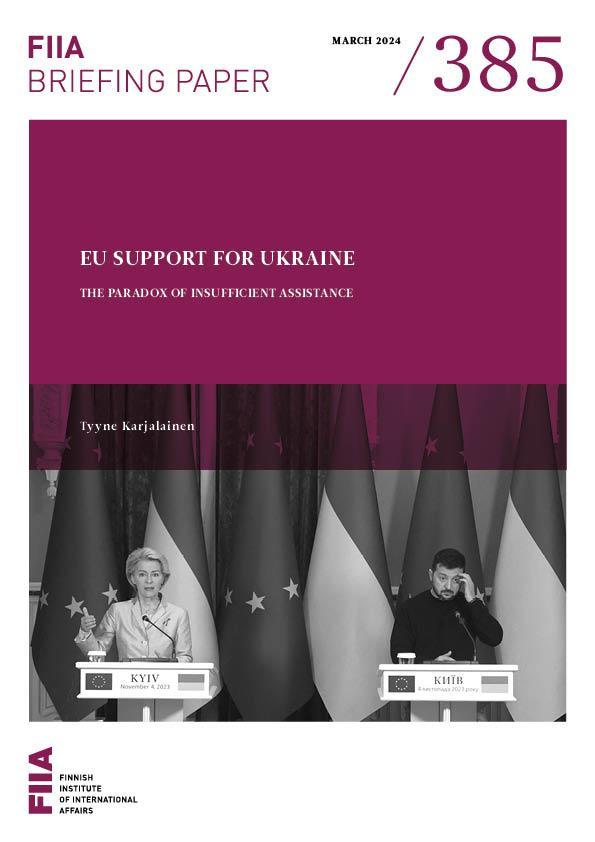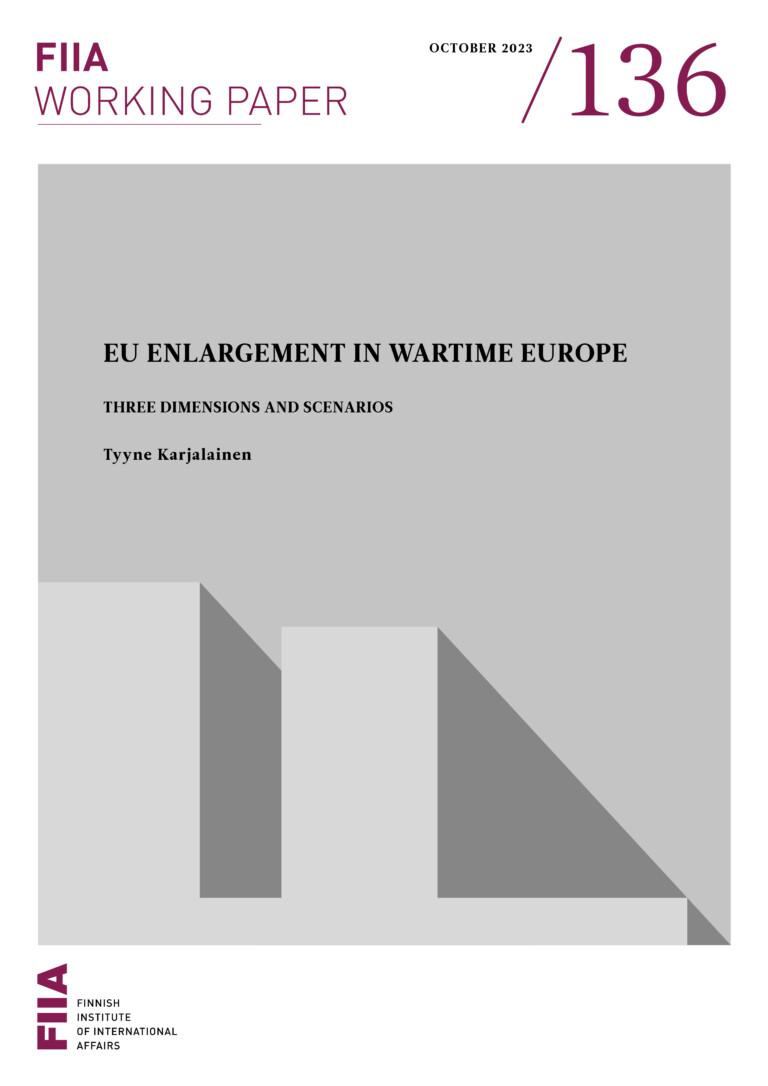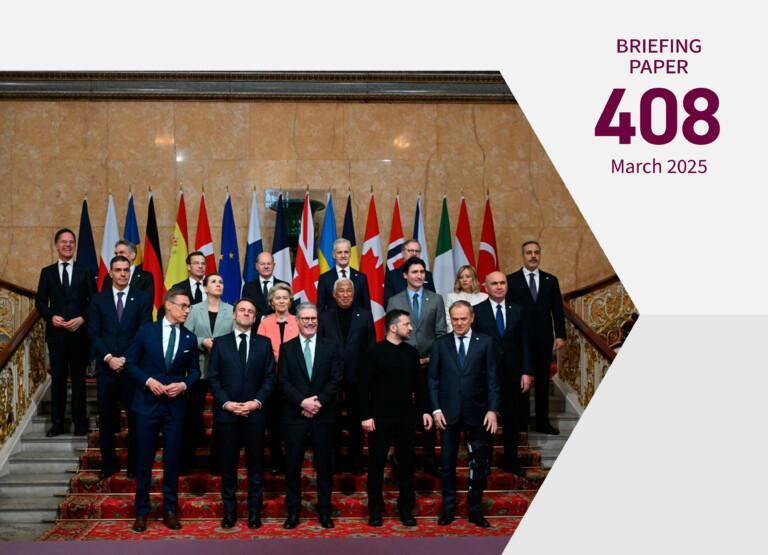
Since Russia started its aggression against Ukraine in 2014, EU member states have lacked the political will to firmly contest Russia’s imperialism in the shared neighbourhood. This was concretized in the rejection of Ukraine’s EU path and the failure to build Ukraine’s military capabilities before 2022. The EU’s response to Russia’s full-scale invasion has been more successful than expected considering its limited capabilities and some past failures of international security assistance.
The West is, however, failing to equip Ukraine to win the war. This paradox of insufficient aid leaves Ukraine in limbo, whereby it is enabled to continue the defence effort but without adequate means to succeed.
In theory, the EU backs Ukraine’s strategy of non-negotiation with Russia, but the limited military support is pushing Kyiv towards peace talks. EU capitals continue to disagree over the extent to which Russia’s imperialist policies need to be suppressed, and whether small concessions could help to end the war in Europe.
Even in the scenario where Ukraine emerges from the war as a truly sovereign state, the risk of future Russian interference, combined with Ukraine’s particular vulnerabilities and the likely challenges of post-war reconstruction, cast a shadow over its immediate future.
Introduction
After Russia launched its full-scale invasion of Ukraine, the EU exceeded all expectations when it handed Kyiv two closely guarded envelopes: funding for weapons and an offer of membership. In 2024, the EU is failing to deliver on either of these policies. Fears of the war expanding and a lack of preparedness have reduced and slowed the military assistance that would enable Russian troops to be pushed back behind Ukraine’s internationally recognized borders. Months of delays in the EU’s political decisions to deliver modern battle tanks, air defence systems, long-range missiles, fighter jets – or any armaments at all to Kyiv to begin with – have contributed to military and human losses and to the fading of a European and democratic perspective for Kyiv.
New problems have also emerged. Ukraine’s European supporters are running out of supplies, lack production capabilities, and are embroiled in political conflicts over military spending. Having failed in its counter-offensive, Ukraine faces the risk of a renewed major offensive by Russia. The pressure to resolve the conflict through negotiations is increasing. The EU politically supports Kyiv’s decision not to negotiate with Putin, but insufficient military aid de facto pushes Ukraine towards peace talks. It is believed that Moscow will use negotiations to prepare for another military attack or to control Kyiv politically.[1] Even if Ukraine maintains its sovereignty in the current war, the threat of a Russian intervention remains.
Furthermore, the geopolitical pressure increases the risk that Ukraine’s supporters will downplay some of Ukraine’s internal challenges or ignore the lessons learned in the past from providing international assistance to fragile states. The multifaceted effects of the war on different segments of society, combined with Ukraine’s vulnerable democracy, inefficient governance and weak rule of law, pose an enormous challenge to Kyiv. At the same time, the government should have the ability to focus on modernizing the economy and implementing reforms for EU membership.
Considering these realities, this Briefing Paper reviews the EU’s[2] past and expected political, economic, and military support for Ukraine. The paper argues that while EU support for Ukraine between 2022 and 2024 has been more successful than expected, insufficient assistance prevents Ukraine from meeting the foreign policy objectives of either Kyiv or the EU capitals. The paper draws on interviews that the author conducted with officials in Kyiv, Brussels, Berlin, Paris, Warsaw, Copenhagen, Stockholm, and Helsinki in 2023.[3]
Political and economic support: From ambiguity to fragile success
In February 2022, EU support for Ukraine could not be taken for granted. Despite Ukraine’s Association Agreement (2017) and the Deep and Comprehensive Free Trade Agreement (DCFTA, 2016) with the EU, Ukraine was not a foreign policy priority for most European states before then. Instead, EU member states often considered Moscow’s interests in their Ukraine policies. Ukraine’s quest for EU integration was sidelined, its calls for defence support largely neglected, and only mild economic sanctions were imposed on Russia after the annexation of Crimea in 2014. Russia’s grip on the Donetsk and Luhansk regions in Eastern Ukraine was even consolidated in the Minsk agreements brokered by Germany and France in the Normandy Format together with Russia and Ukraine in 2014 and 2015.[4]
According to officials in EU capitals, the previous lack of support was also linked to a perception of Ukraine as an unreliable partner: after the turbulent foreign policy years under former presidents Viktor Yushchenko and Viktor Yanukovych, the two related civic uprisings, the prevalent corruption and the lack of reforms in Ukraine, European leaders were concerned about Kyiv’s future orientation. The EU also lacked the capacity to provide hard security support or to integrate new members into the Union, even if there was the political will to do so.
Against this backdrop, the EU’s response to Russia’s full-scale invasion came as a positive surprise to observers both in Kyiv and in the EU capitals.[5] In financial terms, the EU institutions have committed 77.2 billion euros in financial aid to Ukraine,[6] and the pledges are on the increase – the most recent package of loans and grants, called the “Ukraine Facility”, is also the biggest. According to the Kiel Institute, the total aid committed by EU member states and institutions amounts to 144.13 billion euros, twice as much as from the US. On the other side of the war economics, the EU has also continued to approve new packages of economic sanctions against Russia, with the thirteenth package being tabled in February 2024. The impact of the sanctions has been a disappointment, however, as Russia has been able to finance and equip its army by exploiting loopholes in the sanctions regime and by continuing energy trading with both Europe and other partners.
In political terms, the biggest achievement for Ukraine was gaining the prospect of EU membership following the epoch-making train journey to Kyiv in June 2022 by French President Emmanuel Macron, German Chancellor Olaf Scholz, former Italian Prime Minister Mario Draghi, and Romanian President Klaus Iohannis. The credibility of the offer continues to be questioned in EU capitals, since the membership process is known for its unreliability and protracted nature, while Ukraine is also at war.[7] Yet the current EU leadership is committed to Ukraine’s European future, demonstrated by the opening of accession talks with the country in December 2023. Moreover, Ukraine’s political development has new security political relevance for EU states, which regard its experienced and relatively well-equipped army as a useful asset. They see the membership process as a way to decrease the risk of autocratic developments and the risk of democratic control over the armed forces being dismantled.
The geopolitical urgency of Ukraine’s EU integration has encouraged some to downplay the challenges that Ukraine faces in meeting the membership criteria. Even the EU Commission’s 2024 enlargement package and its communications portray Ukraine’s reforms in a positive light. This risks raising overly optimistic expectations in Kyiv about the timeline for the process, which is something that EU leaders have been particularly keen to avoid.
In addition to the war, Ukraine’s specific problems include the rampant political corruption and inefficient governance that complicate the adoption and implementation of the EU acquis, namely the set of common rights and obligations that bind all member states. This is compounded by lack of reform of the judicial system, which currently allows politicians and officials to evade responsibility. The post-war reconstruction phase will carry particular risks, such as poorly planned international support, which fuels chaos and corruption or distorts local power dynamics. The EU membership process is deemed the best EU instrument to support the transformation of captured states into stable democracies. Yet the results have been limited, as demonstrated by the pendulum-like progress in the Western Balkans.
The EU’s political support for Kyiv now includes backing for Ukraine’s strategy of non-negotiation with Russia. This support was not self-evident, considering past experiences with the Normandy format and other Moscow-EU cooperation. However, interviews in Berlin, Paris and Kyiv reveal that while support for Kyiv’s position of non-negotiation remains, the idea of European “big powers” needing to consider each other’s interests at the cost of smaller ones has not disappeared. The risk remains that Ukraine’s supporters will encourage it to sign a peace deal that limits its foreign political leeway and development in the long term, or that Russia will use such peace talks to prepare for a new attack. Ukraine’s democratization and EU integration will likely never be accepted by President Vladimir Putin’s Russia, which aims to control Kyiv by any means available for the foreseeable future. Ukrainians do not see a peace deal changing that, which is why military resistance remains the most feasible strategy for maintaining sovereignty.
Finally, the EU’s political support for Ukraine could be undermined by underlying disagreements among EU members. It is not only Hungary that is repeatedly opposed to assistance measures, as dissent persists beneath the surface elsewhere. The EU has declared that it will support Ukraine for “as long as it takes”, but disagrees on “it” – namely the desired outcome of the war. While EU member states share the objective of avoiding a nuclear or territorial escalation, views differ on the extent to which Russia’s imperialist policies can or should be suppressed. Some European states are willing to accept concessions to Moscow in return for the absence of war in Europe. However, if Ukraine’s EU membership is a real foreign policy objective, the EU will need to keep challenging the Kremlin’s foreign policy goals for at least the next decade. Ukraine is unlikely to meet the criteria much sooner.
Military aid: The EU is not fully committed to a Ukrainian victory
Since Russia started its aggression against Ukraine in 2014, European states have been hesitant to provide military support to Ukraine. Between 2014 and 2022, the US was the main contributor to the capacity building of the Ukrainian armed forces. Canada, the UK, Lithuania, and Poland also played a role. On a large scale, Ukraine did not receive training or materiel from most of its EU partners.[8] Germany and France prioritized the diplomatic conflict resolution effort in the Normandy format, and the EU explicitly excluded any military elements from its neighbourhood policies.[9] The two main reasons for this were the attempt to avoid triggering Russia and concerns about Ukraine’s reliability.
Hence, it was a surprise when the EU took the decision to jointly fund arms deliveries to Ukraine in 2022. As of February 2024, its military assistance was worth 28 billion euros, 6.1 billion of which is funded jointly through the European Peace Facility. Most recently, in mid-March, the EU agreed on a Ukraine Assistance Fund worth 5 billion euros, to be established as part of the Peace Facility. The deal was an achievement after months of quarrelling, with Berlin being critical of its large share of the EPF costs, Paris insisting on the funds being used on Europe-made weapons, and Budapest blocking Ukraine assistance to start with. The pot is, however, only one-fourth of the 20-billion-euro plan that was originally discussed and expected from the EU. In comparison, US military assistance for Ukraine is estimated at 42.2 billion euros,[10] but its continuation is currently at risk. In addition to sending defence materiel, the EU is training Ukrainian troops in Poland and Germany under the EU Military Assistance Mission (EUMAM) in support of Ukraine.
Interviews in Kyiv suggest that the EU weapon deliveries are significant for the defence effort, and the training is relevant for the troops. Generally, Ukraine is not receiving materiel or training deemed useless. Yet since the weapons originate from more than twenty states, problems of incoherence and incompatibility have not been wholly avoided. On the other hand, coordination between donors is considered relatively effective. This means that at least some of the typical problems relating to international security assistance – namely the aid being useless or totally uncoordinated – have been averted in the case of military support for Ukraine.
Ukraine’s ability to use modern equipment, and the absence of reports of major cases of misuse or the disappearance of materiel, have increased confidence in Kyiv and encouraged further support. In January 2024, EU defence ministers already pledged 21 billion euros in military aid for Ukraine for the same year, with the latest 5-billion-euro Ukraine Assistance Fund likely going towards this pledge. Furthermore, Kyiv signed bilateral security guarantees with Berlin, Paris, and London, aimed at long-term capacity building and deterrence. The absence of reports of misuse is, however, partly linked to the reluctance of the usual defence-related corruption watchdogs in Kyiv to jeopardize international support by publicizing cases. Vigilance should duly be maintained regarding long-term capacity building and support for reform of the Ukrainian armed forces.
From Kyiv’s point of view, the main problem regarding support is the materiel that Ukraine is not receiving (e.g., certain long-range capabilities) and the materiel that it is receiving too slowly or insufficiently (e.g., ammunition). Future problems might also include the materiel that Ukraine is no longer receiving. The delays that initially originated from escalation and reliability concerns are now compounded by shortages caused by limited stocks and poor production capacities. Further delays are expected due to political disagreements over the share of costs and whether priority should be given to developing European industrial capacities or to quickly buying off the shelf from the international market: while a compromise of sorts was reached over the Ukraine Assistance Fund, the disagreements are likely to continue over implementation of the fund. While the EU is not running out of money, domestic political obstacles to Ukraine aid might emerge with the many upcoming elections. At the same time, Europe’s role as Ukraine’s military partner might increase, as Ukraine aid has also become a bone of contention in the US, where President Joe Biden is struggling to get Congress behind the next aid package.
While the support remains at current levels, Ukraine is not being equipped to win the war, in terms of pushing Russian troops outside its internationally recognized borders. The current level of support leaves Ukraine in limbo between defeat and victory. It is necessary to recognize that the paradox of insufficient assistance is contributing to a protracted war, wasted resources, an increasing number of casualties and the continued suffering of the civilian population. It is questionable whether Kyiv’s negotiation power has improved during the two years of war as expected. As researchers have argued, the half-measure support paves the way for a new full-scale offensive by Russia that Ukraine might not be able to defeat with the current level of assistance.[11] Not only Ukraine’s future but also Europe’s own security is at stake: a Ukrainian defeat would be expected to spur further aggression by Moscow.[12]
Finally, international assistance also comes with accountability. Whether the current level of EU military support is legitimate as such cannot solely be attributed to the Ukrainian state leadership. The legitimacy of the military assistance also depends on whether it is in line with societal support for Ukraine’s foreign policy strategy. Thus far, opinion polls show strong support for the defence effort, although it is important to acknowledge the margin of error in wartime polls. While domestic mistrust towards President Volodymyr Zelenskyy is increasing, 60% of Ukrainians continue to trust him. Readiness for territorial concessions reportedly increased slightly between May and December 2023, but 74% of Ukrainians in December agreed that “Under no circumstances should Ukraine give up any of its territories, even if this means the war will last longer and there will be threats to the preservation of independence”.[13] Ultimately, only Ukrainians are in a position to define the price tag for Ukrainian state borders or independence.
Conclusions: Overcoming the paradox of insufficient aid
Ukraine is embroiled in a devastating war and is suffering increasing losses. It is relevant to ask, therefore, whether negotiations could put an end to the violence. At the same time, it is necessary to understand why Ukrainians continue to support the defence effort. Negotiations could end the fighting for now, but also put Kyiv on Moscow’s political leash – in which case the two years of war would have been a waste of lives and resources. The absence of war does not equate to peace: a prosperous future can also be ruined by oppression through other means.
The current level of military assistance for Ukraine (such as the 5-billion-euro Ukraine Assistance Fund instead of the previously discussed 20-billion-euro pot) reveals that the EU is not in practice committed to Ukraine’s victory. The level of ambition should at least be to overtake the US lead in military assistance: if Europe does not take more responsibility for its own security, it is difficult to justify why the US should do so in the future.
The insufficient aid compromises Ukraine’s quest to develop into a stable European democracy. If the EU does not increase its support for Ukraine, the pressure on Kyiv to enter into negotiations with Moscow will increase. The EU is not determined to push Kyiv into a bad deal. It can also still help Ukraine to win the war. While European stocks have their limits, the real limits of international assistance depend on political will and strategy. If escalation fears make it impossible to provide Ukraine with better weapons, preventing Ukraine from running out of the materiel it is already using would also help.
At the same time, merely supporting Ukraine’s defence is not sufficient to ensure a bright future for the country. Sovereignty alone does not guarantee success. As one interviewee in Kyiv put it, the defence effort will be meaningless if post-war Ukraine turns out to be an empty war camp without human rights, democracy, and economic opportunities. The risks include wartime chaos that exacerbates the weaknesses within Ukraine’s state institutions and political system, or post-war reconstruction and international support that inadvertently fuel these problems. In order to support Ukraine’s democratic development and EU integration, Ukraine’s international supporters should also study the country’s reform history and learn from past mistakes of international state-building efforts in other fragile contexts. Recognizing Ukraine’s vulnerabilities and addressing the likely obstacles to Ukraine’s membership path is imperative if the EU is not ready to give up on Ukraine’s European and democratic future.
Endnotes
[1] See also Saari, Sinikukka (2023) “Deterring Russia in Ukraine: The only way to achieve sustainable peace”. FIIA Comment 13. https://fiia.fi/en/publication/deterring-russia-in-ukraine.
[2] The EU refers here to the entity of 27 member states and EU institutions, sidelining internal divisions.
[3] The interviews were conducted as part of the author’s ongoing doctoral research, conducted with funding from the Finnish Cultural Foundation.
[4] See e.g., Dumoulin, Marie (2024) “Ukraine, Russia, and the Minsk agreements: A post-mortem”. ECFR Commentary. https://ecfr.eu/article/ukraine-russia-and-the-minsk-agreements-a-post-mortem/; or Duncan, Allan (2020) “The Minsk Conundrum: Western Policy and Russia’s War in Eastern Ukraine”. Chatham House Research Paper. https://www.chathamhouse.org/2020/05/minsk-conundrum-western-policy-and-russias-war-eastern-ukraine-0/summary.
[5] Raik, Kristi, Blockmans, Steven, Osypchuk, Anna & Suslov, Anton (2024) “EU Policy towards Ukraine: Entering Geopolitical Competition over European Order”, The International Spectator, 59:1, 39–58, https://doi.org/10.1080/03932729.2023.2296576.
[6] Trebesch, Christoph et al. (2023) “The Ukraine Support Tracker” (Updated Feb. 16, 2024). Kiel Institute. https://www.ifw-kiel.de/topics/war-against-ukraine/ukraine-support-tracker/.
[7] Karjalainen, Tyyne (2023) “EU enlargement in wartime Europe: three dimensions and scenarios”, Contemporary Social Science, 18:5, 637–656, https://doi.org/10.1080/21582041.2023.2289661.
[8] See e.g., King, Iain (2019) “Not Contributing Enough? A Summary of European Military and Development Assistance to Ukraine Since 2014”. CSIS Analysis. https://www.csis.org/analysis/not-contributing-enough-summary-european-military-and-development-assistance-ukraine-2014.
[9] Nizhnikau, Ryhor & Moshes, Arkady (2024) “The war in Ukraine, the EU’s geopolitical awakening and implications for the ‘contested neighbourhood’”. Policy Studies. https://doi.org/10.1080/01442872.2024.2306972.
[10] Trebesch, Christoph et al. (2023) “The Ukraine Support Tracker” (Updated Feb. 16, 2024). Kiel Institute. https://www.ifw-kiel.de/topics/war-against-ukraine/ukraine-support-tracker/.
[11] Moshes, Arkady (2023) “Two years of war in Ukraine: Will the West need another shock to act decisively?” FIIA Comment 3. https://fiia.fi/en/publication/two-years-of-war-in-ukraine.
[12] See e.g., Fabbrini, Federico (2023) and Legucka, Agnieszka (2023) in Dempsey, Judy (ed.) “Judy Asks: Is Europe Still Committed to Ukraine?” https://carnegieeurope.eu/strategiceurope/91246.
[13] Hrushetskyi, Anton (2023) “Dynamics of Readiness for Territorial Concessions to End the War as soon as Possible: Results of a Telephone Survey Conducted on November 29–December 9, 2023” and “Direction of Affairs in the Country and Trust in Political, Military and Public Figures”. Kyiv International Institute of Sociology. https://www.kiis.com.ua/?lang=eng&cat=reports&id=1332#_ftnref1.








